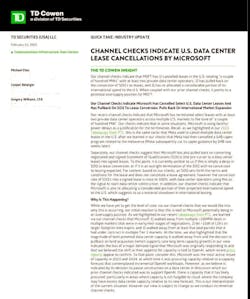Does It Matter If Microsoft Is Cancelling AI Data Center Leases?
It is being reported that Microsoft has recently canceled several data center leases in the U.S., prompting concerns about its long-term AI infrastructure strategy. According to TD Cowen, the tech giant voided agreements amounting to "a couple of hundred megawatts" of capacity, roughly equivalent to two large data centers.
While these cancellations have raised broader questions about whether Microsoft is securing more AI computing capacity than necessary, it is very important to consider everything in context.
The Report
TD Cowen's investigation suggests that Microsoft has pulled back on converting Statements of Qualifications (SOQs) into formal leases.
The company has also reallocated a significant portion of its international investment to the U.S., a move that potentially indicates a slowdown in global expansion, though it could also be a reaction to the current federal government's announced plans to bring manufacturing and strategic technologies back to within US borders.
The concern seems to primarily be due to analysts pointing out that Microsoft let more than a gigawatt of agreements expire and withdrew from multiple 100 MW deals across various locations.
Context Is Everything
Microsoft, who has refuted the TD Cowen report, released a statement to many media outlets yesterday reiterating their commitment to data center investment over the next year, saying, in part:
Thanks to the significant investments we have made up to this point, we are well positioned to meet our current and increasing customer demand, Last year alone, we added more capacity than any prior year in history. While we may strategically pace or adjust our infrastructure in some areas, we will continue to grow strongly in all regions. This allows us to invest and allocate resources to growth areas for our future. Our plans to spend over $80 billion on infrastructure this FY remains on track as we continue to grow at a record pace to meet customer demand.
Downplaying Concerns
So in their official response, Microsoft has downplayed concerns, reiterating its commitment to spending $80 billion on AI infrastructure this fiscal year.
The company stated that while adjustments may occur, its overall growth trajectory remains unchanged. CEO Satya Nadella emphasized that Microsoft continues to face an "exponential demand" for AI computing and will sustain high levels of investment.
And while the TD Cowen report identified several data centers that would be impacted by this potential cutback from Microsoft, no specific reason has become clear, though there is significant conjecture.
Several hypotheses have emerged as to motivation for these potential changes:
Workload Redistribution: OpenAI, Microsoft’s key AI partner, has reportedly started shifting workloads to Oracle, reducing dependency on Microsoft’s Azure cloud. This would come about as part of the $500 billion Stargate project recently announced where the initial equity funders are SoftBank, OpenAI, Oracle, and MGX, which implies that the Oracle Cloud infrastructure could see more of OpenAI’s business.
But it is important to note that the key initial technology partners for the project are identified as Arm, Microsoft, NVIDIA, Oracle, and OpenAI. While some analysts are taking the view that this indicates a reduction in Microsoft’s role with OpenAI, which currently run on Microsoft Azure, there is no claim that this $500 billion project will reduce the OpenAI spend on Microsoft-driven resources.
It should also be noted that it has been reported that Microsoft has the “right of first refusal” with OpenAI and moderating their involvement could also be seen as not putting all their eggs in one basket while expanding their options and staying involved.
And as OpenAI stated in their Stargate announcement:
This also builds on the existing OpenAI partnership with Microsoft. OpenAI will continue to increase its consumption of Azure as OpenAI continues its work with Microsoft with this additional compute to train leading models and deliver great products and services.
Strategic Reallocation: Microsoft is a major owner and operator of data centers and might be reallocating resources to in-house infrastructure rather than leased spaces.
Supply Chain Delays: TD Cowen noted that Microsoft used power and facility delays as justifications for voiding agreements, a tactic previously employed by Meta.
Oversupply Issues: Analysts at TD Cowen speculate that Microsoft may have overestimated AI demand, leading to an excess in capacity. As it is all speculation, it could simply be that the latest information has driven Microsoft to reevaluate demand and move to more closely align projected supply with projected demand. Microsoft has reiterated their commitment to spend $80 billion on AI in the coming year. Reallocating this spending internally or wit a different set of partners remains on the table.
And when you put the TD Cowen report that Microsoft has cancelled leases for “a couple hundred megawatts” into context with Microsoft’s overall leased power, which is estimated at around 20 GW, you see that more than 98% of their energy commitment remains unchanged.
Investment Markets Might See the Biggest Hits
Microsoft’s retreat has had ripple effects on the stock market, particularly among energy and infrastructure companies. European firms like Schneider Electric and Siemens Energy experienced a decline in stock value, indicating fears that major AI companies might scale back energy-intensive data center investments.
However, at press time we have not seen any other indicators that this is an issue as despite these concerns about potential AI overcapacity, major tech firms continue to invest heavily in AI infrastructure:
- Amazon: Pledged $100 billion towards AI data centers.
- Alphabet (Google): Committed $75 billion.
- Meta (Facebook): Planning to spend up to $65 billion.
- Alibaba: Announced a $53 billion investment over the next three years.
If we see a rush of announcements identifying retrenchment by other players in the AI/Hyperscaler market, then it will definitely be time to take a step back and reconsider the trajectory the AI-driven data center development is on.
AI Is Here To Stay
And, of course, critics argue that while tech giants are making unprecedented investments in AI, the real-world applications remain limited.
Couple this with the recent emergence of potentially more cost-efficient open-source AI models, such as those developed by DeepSeek, which has intensified debates about whether Big Tech is overcommitting to AI infrastructure.
But few are arguing that AI will not continue to grow -- and preparation to meet the demand will fluctuate much as any new technology does, especially as those real-world applications for AI become more prevalent.
Conclusion
Microsoft's purported decision to cancel data center leases signals a potential recalibration of its AI strategy. Whether this is a sign of cautious planning or an oversupply issue remains to be seen. As AI adoption evolves, companies will need to strike a balance between meeting demand and avoiding unnecessary capital expenditures. Investors and industry stakeholders will closely watch how Microsoft and its competitors navigate this dynamic landscape.







